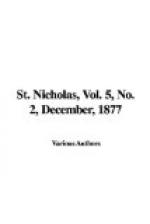A very familiar spectacle at sea is a school of porpoises—or “porpusses,” as the sailors call them. As soon as a school catches sight of a ship, they immediately make a frantic rush for it, as if their life depended upon giving it a speedy welcome. After diving under the vessel a few times to inspect it and try its speed, they take their station under the bows, just ahead, and proceed to cut up every antic that a fish is capable of. They jump, turn over, play “leap-frog” and “tag” in the most approved fashion. Their favorite antic is to dive a few feet and then come to the surface, showing their backs in a half circle, and then, making a sound like a long-drawn sigh, disappear again. Sailors call them “sea-clowns,” and never allow them to be harmed.
They are met with in schools of from two or three to thousands. They often get embayed in the inlets and shallow rivers which their curiosity leads them to investigate. A porpoise once came into the Harlem River and wandered up and down for a week seeking a way out. One day he suddenly made his appearance amid some bathers and scattered them by his gambols.
When they change their feeding-places, the sea is covered for acres with a tumultuous multitude of these “sea-clowns,” all swimming along in the same direction.
When one of these droves is going against the wind (or to windward), their plungings throw up little jets of water, which, being multiplied by thousands of fish, present a very curious appearance.
THE WILD WIND.
BY CLARA W. RAYMOND.
Oh, the wind came howling at our house-door,
Like a maddened fiend set
free;
He pushed and struggled with gasp and
roar,
For an angry wind was he!
He dashed snow-wreaths at our window-panes,
The casements rattled and
creaked;
Then up he climbed to the chimney tops,
And down through the flues
he shrieked.
He found Jack’s sled by the garden
fence,
And tumbled it down in his
spite;
And heaped the snow till he covered it
up,
And hid it from poor Jack’s
sight.
He tore down the lattice and broke the
house
Ned built for the birds last
week;
And he bent the branches and bowed the
trees,
Then rushed off fresh wrath
to wreak.
And oh! how he frightened poor little
Nell,
And made her tremble and weep,
Till mother came up and soothed the wee
maid,
And lulled her with songs
to sleep!
Her tiny hand nestled, content and still,
In her mother’s, so
soft and warm;
While with magical power of low, sweet
tones
The mother-love hushed the
storm.
THE MAGICIAN AND HIS BEE.
BY P.F.




